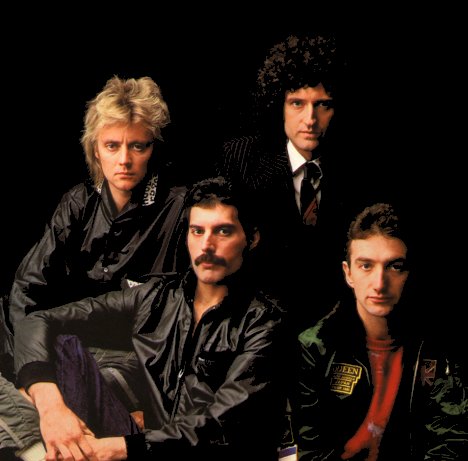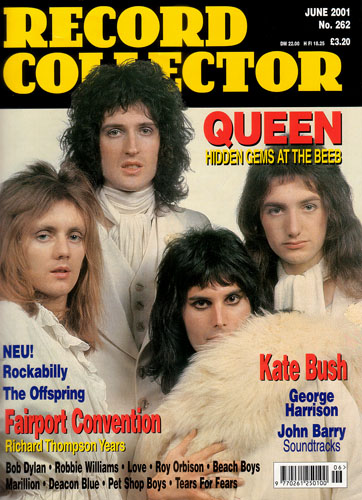06-XX-2001 – Record Collector
Between February 1974 and October 1977, Queen recorded six radio sessions for the BBC. The first and third were issued
in 1989 on Band Of Joy’s “Queen At The Beeb” LP (repackaged and retitled “Queen At The BBC” for the US in ’95), but the remaining four sessions, although widely bootlegged, have never been officially released. Inevitably, they have become some of the most talked-about items in the Queen archive. So, what precisely do the remaining 16 recordings comprise, and are they worthy of release?
The short answer is yes. The lion’s share of the unissued material (featuring tracks from “Queen II”, “Sheer Heart Attack” and “News Of The World”) is significantly different to the familiar versions. It is vibrant and powerful, full of energy, and finds Queen during an inspiring, up-and-coming period.
Although a sequel to “Queen At The Beeb” did look likely to appear for a while back in 1990/91, it was shelved – not least due to the untimely death of Freddie Mercury in November 1991. The BBC material is likely to make its official debut on the forthcoming “Queen Rarities” set – a package currently under development, but which as yet has no definite form or structure.
Following the lavish, comprehensive Freddie Mercury solo box set last year, a similar venture is now underway to gather together Queen rarities and out-takes. A definitive rarities package will only ever be feasible if the content of the band’s audio archives is fully known, and now that this issue is being properly addressed (I have been examining the archives since 1998), the BBC AWOLs may at last have a home on which to make their long overdue debut.
By way of re-acquaintance, let’s take a trip back a quarter of a century, to those bygone days of black nail polish and platform heels and Zandra Rhodes capes to what is for many fans the most interesting period in Queen’s history: the early 70s.
Regardless of the fact that the first I third sessions were released as eight-track album back in December 9, it is logical to revisit each session in turn.
SESSION 1
FEBRUARY 5, 1973 – LANGHAM 1 STUDIO, LONDON.
My Fairy King / Keep Yourself Alive / Doin’ Alright / Liar
Queen had been playing the live circuit for barely two years (roughly 40 shows) yet, as is clearly evident from this early session. quickly becoming an accomplished act. Though booked for just the one session the response from Radio I1 listeners was such that the band were invited back a further five times. While Queen signed a publishing deal they had not yet secured a record deal, and so this them an ideal opportunity to showcase themselves. Bernie Andrews produced the session, accompanied by engineer John Etchells (who later engineered the ‘Live Killers’ album). For the most part, the material committed to tape is similar to that which surfaced on Queen’s debut album on July 13th, 1973.
Freddie’s timeless “My Fairy King” has an uncomplicated less polished feel about it, and is generally less fussy than the familiar album cut. The lead and backing vocals are much clearer Freddie’s subtle piano parts are also more defined. An ethereal lead vocal makes the song a memorable recital of this underrated composition. “Keep Yourself Alive” (which became the band’s first single, on July 6th) and the pre-Queen Staffell/May Smile refugee, “Doin’ Alright”, are reproduced almost note-for-note to the album versions (though the latter features Roger Taylor singing lead vocal on the last verse), and “Liar” contains vocal ad-libs not present on the long-player version.
For much-needed clarification on precisely how this and the other sessions were recorded, I asked Brian May for an explanation. “Essentially the BBC recordings were short cuts,” he reveals. “We started off with backing tracks, which were already in progress for the album, and over-dubbed the vocals – a guitahere and there, and other things. So what you are hearing is a mixture of stuff recorded at Trident Studios, and stuff recorded very hurriedly in the BBC studios. Time and facilities were tight, which dictated that we record the sessions in that way. Typically, we would do one or two tracks live, but adopt this compromise for the others.”
Queen’s inaugural BBC session was broadcast on Radio 1, ten days after recording, on John Peel’s evening show as part of the Sounds Of The Seventies seriesSession 2
JULY 25, 1973 – LANGHAM 1 STUDIO
See What A Fool I’ve Been / Liar / Son & Daughter / Keep Yourself Alive
As with their first session~ Queen recorded songs with which they are. most comfortable’ material featuring in their live set of the day. This time the session was produced by Jeff Griffin and engineered by Chris Lycett and John Etchells. The tracks were transmitted on August 13th on the Alan Black show.
Curiously, the band recorded further versions of “Liar” and “Keep Yourself Alive”, as they did in February (which mirror the album versions closely, save for the odd Freddie ad-lib and an additional guitar part) plus a fresh, word-perfect rendering of “Son And Daughter” (minus the ‘shovel shit’ line, so as not to offend BBC listeners, and including Roger’s “Steel yourself, this is valid” interjection). This take features a significant departure from the familiar version two-thirds of the way through, making this an attractive, off-kilter alternative.
Sadly, Brian’s sublime “The Night Comes Down” and Freddie’s starkly contrasting “Jesus” were both overlooked, and were, as it turned out, the only tracks on the debut album not represented in BBC sessions (the I lyrics to “Seven Seas Of Rhye” had yet to be written at this point, and were only finished in time for “Queen II”).
Although “See What A Fool I’ve Been” was not included on the album, and only appeared as flipside to “Seven Seas Of Rhye” (Queen’s first charting single), like all three other tracks, it did feature in the live set of the time and so was a logical choice for this session. This session version features Freddie’s ‘proper’, more sober vocal delivery, in contrast to the tongue-in-cheek alternative which featured as the B-side to “Seven Seas”.
“See What A Fool” is something of an enigma -according to Smile vocalist Tim Staffell, the song was an old blues number he first heard on a Sonny Terry and Brownie McGhee album. Brian came up with a new arrangement, based on the piece, rather than a completely original song.
Brian says: “This song has remained a mystery to me over the years, too. It is based on an old blues number. When I tried to find out the original writer at the time, and again a few years later, I drew a blank. My recollection is that I heard it on a TV show performed, I think, by Muddy Waters. For the Queen session, I just remembered what I could and made up the rest, especially most of the words.”
SESSION 3
DECEMBER 3, 1973 – LANGHAM 1 STUDIO
Ogre Battle / Great King Rat / Modern Times Rock ‘n’ Roll / Son & Daughter.
For this session, Bernie Andrews was the producer and Mike Franks and Nick Griffiths were the~ engineers. Like all the sessions (except the last one), it was broadcast as part of the Radio 1 series, Sounds Of The Seventies, three days after the recording date on John Peel’s programme.
While “Great King Rat” and Roger’s “Modern Times Rock ‘n’ Roll” shadow the familiar recordings, the latter’s rather startling “It’s not that I’m bright, just happy-go lucky” line in the mid-section (not present on the mother album cut, and inspired by Mott The Hoople’s Ariel Bender Queen supported the Hoople on their November 1973 tour) adds a novelty appeal to an intriguing, youthful vocal. According to Brian, Bender used this expression regularly during this period.
Meanwhile, the drama of a further take of Brian’s “Son And Daughter” (a song 20 years ahead of its time) and Freddie’s “Ogre Battle” tale from “Queen II”, are retained in impressive fashion. The original BBC recording contains a lengthy intro section not featured on the 1989 Band Of Joy CD version. Evidently, it was not possible to include the so-called ‘Forgotten Intro’ due to the original BBC recording having been damaged.
This session is as per the second half of the 1989 “Queen At The Beeb” CD a must-have purchase if early Queen is your favourite era.
SESSION4
APRIL 3,1974 – LANGHAM 1 STUDIO, LONDON
Modern Times Rock ‘n’ Roll / March Of The Black Queen / Nevermore / White Queen
Precisely four months after their last visit, the band returned once more to Langham 1 to record: their fourth and final session at this venue for the BBC. The session was transmitted on the Bob Harris show on April 15th.
While the session prior to this saw the band record a version of “Modern Times Rock ‘n’ Roll” virtually identical to the LP cut, the pace was significantly slower, demonstrating that this time, they had decided not to rely upon the existing debut LP backing track. The majestic “White Queen” emerges as the definite stand-out piece from this session, featuring some sublimely subtle piano and guitar extras from Freddie and Brian respectively.
“Nevermore” is delivered with all the dignity and grace of the album cut, but with a dryer feel to Freddie’s vocal. Lovely cymbal subtleties from Roger shine out from this recording, not least because there are no backing vocals or harmonies to mask them until the very last section at least, at which point the song takes on startling embellishments. Backing vocals, drums, bass and lead guitar move in to bring the proceedings to a halt with real style – a truly uplifting recital.”March Of The Black Queen”, as you might expect, is the other showpiece track from this session. Penned by Freddie, the version found on the album encompasses everything within the extensive Queen repertoire, and then some. Although Freddie deviates little from the familiar lyrics, he offers the odd ad-lib by way of extra interest. In essence, this recording of “Black Queen” sounds more like a remix of the original version, rather than a new session take.


